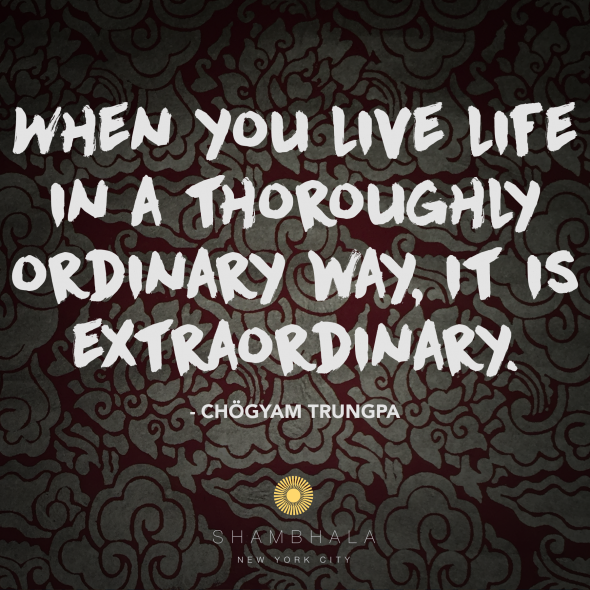What Does It Mean to Be Extraordinary?
If you’re living, working, and generally having a good time in New York City, it is likely not for lack a drive. We all have a longing, a desire to be part of something greater and bigger than ourselves. Something extraordinary.
In many ways, this energy keeps us moving towards a goal or a dream that’s important to us. This can seem harmless enough. After all, our drive keep us in line for the next promotion, the next apartment, even the next good meal! But when our ambition is rooted in an inherent dissatisfaction with ourselves and our world, we experience the pain of longing. We long to be recognized. We long to find someone who understands us completely. We long to stay young forever. We long to be more than we are so we will not have to cope with these basic realities of humanity.
In the quote above, Chögyam Trungpa is suggesting that while the sadness of longing is painful it is also real and beautiful. In fact, it is the only thing that is real and beautiful. If we can learn to take this leap into the reality of our lives, the lives we have been striving to make “better,” we can begin to see that the life we have already is already quite vivid, complete, and cheerful. It is a bold approach, but what the Shambhala Teachings are suggesting is that you already have everything you need to be extraordinary.
Below, read Chögyam Trungpa’s complete passage from Great Eastern Sun, the Wisdom of Shambhala.
To learn more about discovering the simplicity of our natural world, consider enrolling in “Contentment in Everyday Life,” a 5-week course which presents practical tools for relating directly to dissatisfaction and a study of the Shambhala vision of “contentment.”
“The Shambhala approach is to befriend what is there, the everyday occurrence, which is real, obvious, and constant. Then first thought, best thought becomes a shocking experience, which shakes us into reality. It may be the same blue sky and the same car that we drive to work every day. But that ordinariness is extraordinary. This is the dichotomy: when you live life in a thoroughly ordinary way, it is extraordinary. I think you have to try it for yourself, then you’ll understand. I can’t really explain word by word. I wouldn’t even attempt to explain. There is a popular saying in Buddhism that applies at this point: Even the buddhas tongues are numb. There are certain things that even the Buddha can’t explain. It’s a question of doing it. That’s the closest I can come to explaining. You have to do it.”
– Chögyam Trungpa, The Great Eastern Sun

